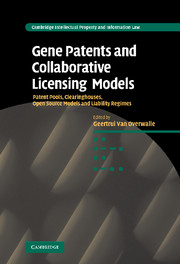 Gene Patents and Collaborative Licensing Models
Gene Patents and Collaborative Licensing Models from Part II - Clearinghouses
Published online by Cambridge University Press: 14 January 2010
Introduction
Access to unique research resources, such as biological materials and reagents, is vital to the success and advancement of science. Many research protocols require assembling a large and diverse set of materials from many sources. Yet, often the process of finding and negotiating the transfer of such materials can be difficult and time-consuming. The ability to locate materials based on their descriptions in journal articles is often limited by lack of sufficient information about origin and availability, and there is no standard citation for such materials. In addition, the process of legal negotiation that may follow can be lengthy and unpredictable. This can have important implications for science policy, especially when delays or inability to obtain research materials result in lost time, productivity and research opportunities. These transactional barriers for material transfer may ultimately have more impact on the productivity of basic laboratory science than concerns related to patents or other intellectual property.
Science Commons, a project of Creative Commons, is a non-profit initiative that promotes policy and technology that remove unnecessary legal and technical barriers to scientific collaboration and innovation. Science Commons's Material Transfer Agreement Project seeks to reduce unnecessary barriers to the transfer and reuse of basic research materials and reagents by proposing a scalable and flexible infrastructure for searching, negotiation, and tracking.
The MTA Project is a prototype of what van Zimmeren calls a “standard licence clearinghouse”. However, material transfer agreements are not necessarily, or even frequently, about licensing patents.
To save this book to your Kindle, first ensure [email protected] is added to your Approved Personal Document E-mail List under your Personal Document Settings on the Manage Your Content and Devices page of your Amazon account. Then enter the ‘name’ part of your Kindle email address below. Find out more about saving to your Kindle.
Note you can select to save to either the @free.kindle.com or @kindle.com variations. ‘@free.kindle.com’ emails are free but can only be saved to your device when it is connected to wi-fi. ‘@kindle.com’ emails can be delivered even when you are not connected to wi-fi, but note that service fees apply.
Find out more about the Kindle Personal Document Service.
To save content items to your account, please confirm that you agree to abide by our usage policies. If this is the first time you use this feature, you will be asked to authorise Cambridge Core to connect with your account. Find out more about saving content to Dropbox.
To save content items to your account, please confirm that you agree to abide by our usage policies. If this is the first time you use this feature, you will be asked to authorise Cambridge Core to connect with your account. Find out more about saving content to Google Drive.